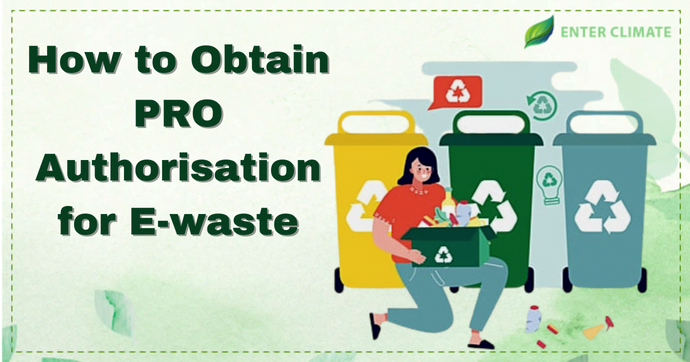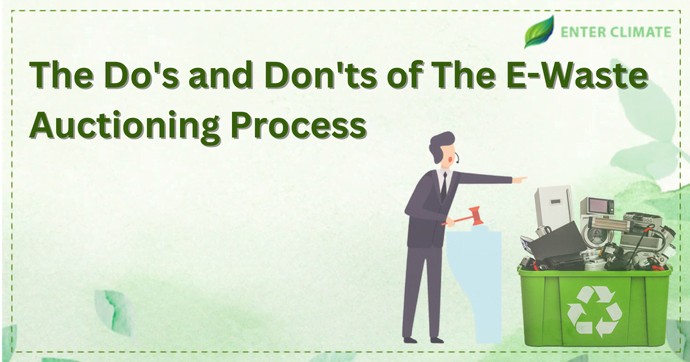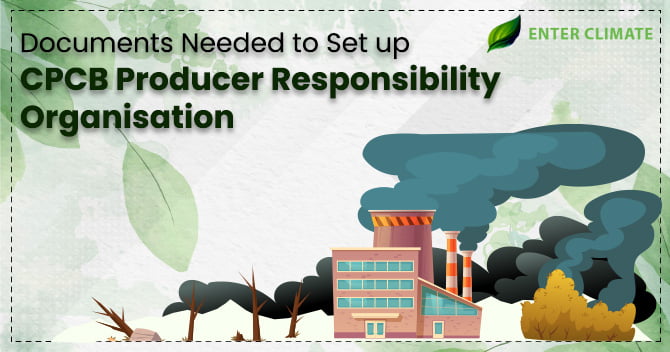How to Obtain PRO Authorisation for e-waste?
 04 Oct, 2022
04 Oct, 2022 
In 2020-21 when the whole world was affected by Covid-19 and everyone was in quarantine, the sales of Electrical and Electronic Equipment (EEE) saw a considerable hike. Although this increase in sales and use of EEE was beneficial for people working or studying from home, it had a detrimental effect on the environment and human health. All this added to the mountains of e-waste that was already accumulating uncontrollably. To control all this, (ProducersResponsibility Organisation)PRO authorisation for e-waste was introduced.
The increase in e-waste makes it the responsibility of not only state authorities but also all the stakeholders, including the Producers/Importers/Brand Owners (PIBOs), to take steps and implement policies to manage this toxic waste. Therefore, under E-waste (Management), 2016, producers have delegated the responsibility of properly managing their end product to reduce electronic waste. This responsibility, known as Extended Producer Responsibility (EPR), is one of the most widely used strategies for managing the influx of waste in countries. The International Telecommunication Union defines e-waste as any and all Electrical and Electronic equipment (EEE) and its components that consumers have thrown away as e-waste without any intention of reuse. It won’t be wrong to say that due to the introduction of the EPR target, PRO authorisation for e-waste was the need of the hour.
In India, as per E-waste (Management) Rules, 2016, EPR sets the target for the producers to complete. Producers can delegate to a third party in exchange for financial help. This third-party organisation assisting producers or manufacturers in fulfilling their EPR target is referred to as the Producers Responsibility Organisation (PRO). The organisation needs to get PRO authorisation for e-waste to establish it.
E-waste in India
It is estimated that 53.6 million tonnes of EEE were discarded by consumers in 2019, indicating a rise of up to 20 per cent in the 20 per cent in last five years. India, a developing country with hubs of tech industries, generates around 3 million tonnes of e-waste annually. This makes it the third most e-waste-generating country, just behind China and the United States of America. According to the Central Pollution Control Board’s(CPCB) report 2020, India generated 1,014,961 tonnes of e-waste, approximately 32% more than the financial year 2018-2019. To manage this many discarded items, PRO authorisation for e-waste is essential.
In India, E-waste is defined as “EEE (electrical and electronic equipment), whether in whole or in part thrown away as e-waste by the bulk consumers or consumer and junks from manufacturing, refurbishment and repair processes.” This includes two categories of e-waste: IT and Telecommunication Equipment and Consumer Electricals and Electronics, which include TV, fridges etc.
But as per international standards, there are six categories: –
- Large equipment: Clothes dryers, washing machines, dishwashing machines, electric stoves, copying equipment, photovoltaic panels and large printing machines.
- Small IT and telecommunications equipment: Cell phones, GPS (Global Positioning System), printers, PC, routers, telephones and pocket calculators.
- Temperature Exchange: Refrigerators, air conditioners, freezers, heat pumps, etc.
- Screens, Monitors: Monitors, televisions, laptops, tablets and notebooks.
- Small equipment: Microwaves, electric shavers, electric kettles, calculators, scales, video cameras, minor electrical and electronic tools, control equipment, remote monitoring and electrical and electronic toys.
- Lamps: LED lamps, high-intensity discharge lamps, fluorescent lamps, etc.
Extended Producer Responsibility and PRO
Before understating PRO authorisation for e-waste, just grasp the basics of EPR. One essential strategy adopted as an initiative toward a circular economy was the introduction of Extended Producer Responsibility. In India, EPR is defined under E-waste (Management) Rules, 2016[1], as the “responsibility of any producer of EEE, for channelising e-waste to ensure environmentally sustainable management of waste electrical/electronic equipment. EPR may comprise of employing a take-back strategy or establishing/instituting collection centres or both and having arranged engagements with registered dismantler or recycler either collectively or individually through a PRO documented by producers/in their EPR Authorisation.”
In simple words, Extended Producer Responsibility is defined as the policy under which the producers are responsible for managing their products in an environmentally sound way to reduce the production of e-waste from their factories. This responsibility delegated to the producers further can also be bestowed to an organisation to lessen the burden. Producer Responsibility Organisation is defined under E-waste (Management) Rules, 2016, rule 3(dd) “as a professional organisation financed or authorised individually or collectively by producers, which can take responsibility for channelisation and collection of e-waste generated from the ‘end-of-life’ of the products to ensure environmentally sound management of such e-waste.” Thus, PRO authorisation for e-waste came into the picture.
As per the definition, PRO is responsible for collecting and transporting e-waste in a sustainable and environmentally friendly way to help producers or manufacturers achieve their EPR target set by the State Pollution Control Board (SPCB). By May 2020, it was recorded that India had 34 registered producer responsibility organisationsissuingPRO authorisation for e-waste.
A PRO can implement EPR through different models:-
- PRO as a non-profit corporation
- PRO as a private organisation
- PRO as a state-run institution/authority
However, the PRO model does not impact the amount or proportion of e-waste to meet the requirements given to the producers by the SPCB or PCC.
Functions of Producer Responsibility Organisation (PRO)
- Ensuring and managing the environmentally friendly way of recycling and dismantling the collected waste.
- Managing the logistics and documents.
- Assisting the producers or manufacturers with the annual/quarterly returns filing as per stipulated provisions.
- Organising various awareness programs to spread over all consciousness among people regarding the channelisation and collection of waste among consumers/producers and bulk consumers.
- Issuing PRO authorisation for e-waste.
- Collection points or centres are to be instituted by the Producers Responsibility Organisation. As per the guidelines published by the CPCB, this may involve the establishment of the collection go-downs or the operation of warehouses.
- Implement a proper and environmentally sustainable collection system to collect waste competently and efficiently.
- Executing the policy of buyback and taking back correctly.
- The function of the Producer Responsibility Organisation also includes providing an effective EPR action plan as the legislation instructs.
PRO Authorisation for E-waste
Before acquiring PRO authorisation for e-waste, the manufacturer has to fulfil the minimum requirements, which include: –
- PROs must have a minimum experience of five years in waste management, including municipal solid waste and plastic waste.
- A statutory body should register the producer responsibility organisation.
- They must have GST, TAN and PAN.
- They must be appropriately authorised and have success stories on the environmentally sustainable disposal of municipal solid waste and plastic waste.
Once these requirements are met, the producer, to get PRO authorisation for e-waste, had to primarily submit an application form with relevant information to the official site of the CPCB as mandated by the E-waste (Management) Rules 2016.
Once the application is submitted, the CPCB has the power to properly review and scrutinise the application to decide to grant PRO authorisation for e-waste. For scrutiny and verification purposes, the board is given 25 days, within which they must reply to the organisation.
If there are no mistakes, the PRO authorisation for e-waste is granted to the organisation. The authorisation is valid for three years and is to be renewed before 60 days of its expiry. The appeal of any discrepancies lies with Central Pollution Control Board Chairman.
Conclusion
The PRO is proving to be the new budding business in India, with a high prospect of increasing the overall market growth. But, if we focus on accurate representation, PRO is struggling to cement its foot in the Indian economy due to corruption and lack of transparency. Therefore, authorities need to take a step forward and promote the establishment of the Producer Responsibility Organisation. One of the ways of doing it can be assisting them in PRO authorisation for e-waste to avoid confusion among the applicants.
Read our Article: How to draft a detailed E-waste Business Plan












